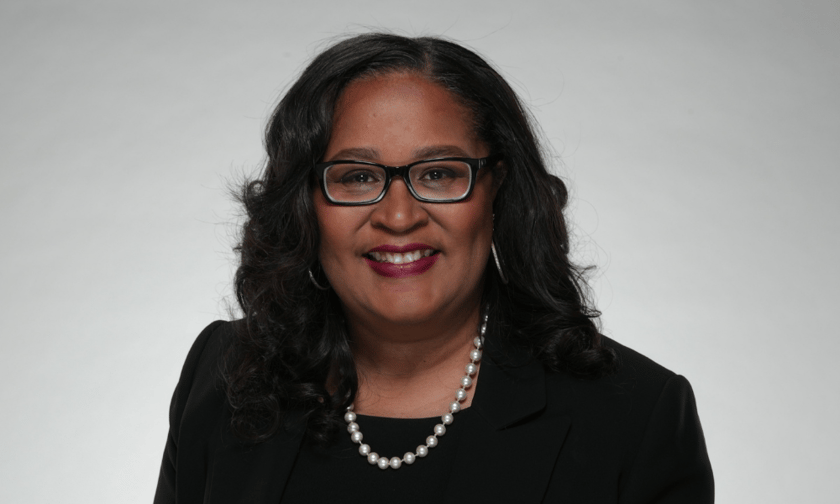

Reflecting on the “omnipresence” of insurance and its ability to impact every function of our society, Rebekah Ratliff (pictured), mediator and arbitrator at JAMS, looked to the role insurance has to play in crafting ‘the next normal’.
Today’s risk environment is both complex and deeply interconnected, she said, with pressing issues including non-financial misconduct, social inflation, geopolitical crisis and financial insecurity. It’s with those risks in mind that JAMS has sponsored an upcoming event discussing ‘The Future of Insurance: Risk and Resolution in an Evolving Industry’.
The fireside chat, which will be held at Lloyd’s of London and moderated by Marsh McLennan’s Chetna Gulati-Kapoor, will look to spotlight the role of mechanisms such as alternative dispute resolution (ADR) in creating solutions for equitable outcomes from these risks. ADR is a global common language, Ratliff said, and it’s the language of harmony. At its core, insurance and risk management exist to bring about peace and harmony, and ADR has a crucial role in setting the beat of what that looks like.
“We’re always talking about what’s next in insurance,” she said. “We are always looking out for new risks, because that directly relates to the profitability of the industry. And in the ADR profession, we’re no different. We want to help resolve the conflicts that arise from those risks. Everywhere you look across the industry, people are thinking about the future and what’s next. And that’s more common than ever since COVID because we’re aware that these risks are evolving, and the world has become more vulnerable.”
There’s a variety of reasons for this increased vulnerability, she said, and a lot of it stems from financial insecurity. Social inflation, in particular, has been under the radar of the insurance and reinsurance industries, with a record-breaking 27 ‘nuclear verdicts’ in the US alone last year. Regulators and compliance bodies, including the FCA, are looking to find pathways to navigate these risks, and she expects the role of ADR to increasingly come into its own amid these ongoing conversations.
“Whether it’s social inflation, DE&I or regulation, everybody is still trying to figure out ‘the next normal’,” she said. “And we haven’t yet. It’s still evolving, so we can’t settle on what’s next and how to really navigate it. For me, as a dispute resolution professional who has a psychology degree and has spent more than three decades as a risk management professional, I use all three buckets of expertise in order to form a holistic view of what risks are out there, and how they impact people on a human level.”
Ratliff noted that understanding the human condition and how it’s affected by risk is critical to creating viable mitigation solutions. She sees first-hand from negotiations how people’s experiences and perceptions shape their communication needs when it comes to conciliation and dispute resolution. “How they’re feeling on any given day does influence how they negotiate at the table,” she said. “We see that in juries too, people react based on emotion. We are emotional beings and so, when we are in conflict, we behave based on the impact that conflict is having on us.”
Between climate change, cyber, access to justice, underserved communities, anti-corporate sentiment, lingering COVID impacts, food insecurity, or housing crises – there’s a lot on the agenda for the upcoming fireside chat. What’s interesting, Ratliff said, is that none of these topics are particularly new. They’ve been looming for a while, but now their impact has increased because they’re all converging at the same time – and they’re impacting people of every socio-economic background and status.
Held on Wednesday, November 6 between 5 and 7:30pm, the event is in-person only this year, she said, in recognition of her conviction that the market is at its best when it’s fostering face-to-face relationship building. This program is designed for any insurance professionals, whether in broking, underwriting or claims, as well as lawyers who handle insurance-related disputes and want to learn more about where the market goes next.
“The reality of our industry, particularly when it comes to conflict resolution and conciliation is that we are all connected,” she said. “We’re looking to celebrate that connectivity at our event. Because it’s only really when you meet people that you realise that it’s six degrees of separation, it’s more like one or two. We’re always finding new ways in which we’re connected. The only real race is the human race.
“People don’t want to be in conflict – whether that’s in very low level or very high level disputes – or with each other on a personal level. We want to find ways to move on and enjoy our lives. And I’m very proud that my role is to drive change in the conciliation space as a mediator and arbitrator. I enjoy the process of working through conflict and helping people find solutions. That is my life's work, that is my passion, and I feel very fortunate to be able to work in this space.”
You can find out more about - and sign up for ‘The Future of Insurance: Risk and Resolution in an Evolving Industry’ here today.
